An animal is a multicellular, eukaryotic organism of the kingdom Animalia or Metazoa.

The Byrds were an American rock band formed in Los Angeles, California, in 1964. The band underwent multiple lineup changes throughout its existence, with frontman Roger McGuinn remaining the sole consistent member. Although their time as one of the most popular groups in the world only lasted for a short period in the mid-1960s, the Byrds are today considered by critics to be among the most influential rock acts of their era. Their signature blend of clear harmony singing and McGuinn's jangly 12-string Rickenbacker guitar was "absorbed into the vocabulary of rock" and has continued to be influential.
Folk rock is a hybrid music genre that combines the elements of folk and rock music, which arose in the United States, Canada, and the United Kingdom in the mid-1960s. In the U.S., folk rock emerged from the folk music revival. Performers such as Bob Dylan and the Byrds—several of whose members had earlier played in folk ensembles—attempted to blend the sounds of rock with their pre-existing folk repertoire, adopting the use of electric instrumentation and drums in a way previously discouraged in the U.S. folk community. The term "folk rock" was initially used in the U.S. music press in June 1965 to describe the Byrds' music.

David Van Cortlandt Crosby is an American singer, guitarist, and songwriter. In addition to his solo career, he was a founding member of both the Byrds and Crosby, Stills & Nash.
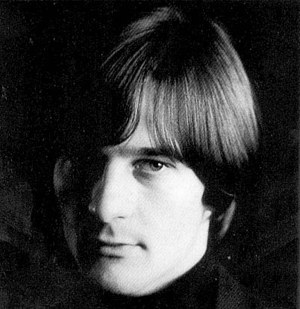
Harold Eugene Clark was an American singer-songwriter and founding member of the folk rock band the Byrds. He was the Byrds' principal songwriter between 1964 and early 1966, writing most of the band's best-known originals from this period, including "I'll Feel a Whole Lot Better", "She Don't Care About Time", "Eight Miles High" and "Set You Free This Time". Although he did not achieve commercial success as a solo artist, Clark was in the vanguard of popular music during much of his career, prefiguring developments in such disparate subgenres as psychedelic rock, baroque pop, newgrass, country rock, and alternative country. He was inducted into the Rock and Roll Hall of Fame in 1991 as a member of the Byrds.
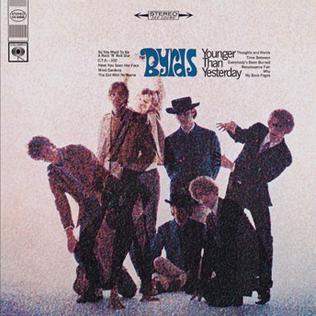
Younger Than Yesterday is the fourth album by the American rock band the Byrds and was released on February 6, 1967 on Columbia Records. It saw the band continuing to integrate elements of psychedelia and jazz into their music, a process they had begun on their previous album, Fifth Dimension. In addition, the album captured the band and record producer Gary Usher experimenting with new musical textures, including brass instruments, reverse tape effects and an electronic oscillator.
Creeper, Creepers, or The Creeper may refer to:
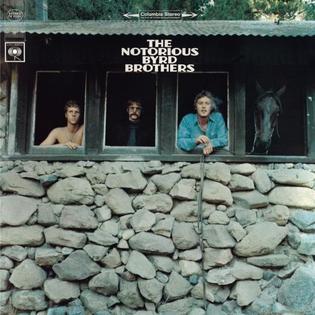
The Notorious Byrd Brothers is the fifth album by the American rock band the Byrds, and was released in January 1968, on Columbia Records. The album represents the pinnacle of the Byrds' late-‘60s musical experimentation, with the band blending together elements of psychedelia, folk rock, country, electronic music, baroque pop, and jazz. With producer Gary Usher, they made extensive use of a number of studio effects and production techniques, including phasing, flanging, and spatial panning. The Byrds also introduced the sound of the pedal steel guitar and the Moog modular synthesizer into their music, making it one of the first LP releases on which the Moog appears.

Fifth Dimension is the third album by the American rock band the Byrds and was released in July 1966 on Columbia Records. Most of the album was recorded following the February 1966 departure of the band's principal songwriter Gene Clark. In an attempt to compensate for Clark's absence, guitarists Jim McGuinn and David Crosby increased their songwriting output. In spite of this, the loss of Clark resulted in an album with four cover versions and an instrumental, which critics have described as "wildly uneven" and "awkward and scattered". However, it was the first Byrds album not to include any songs written by Bob Dylan, whose material had previously been a mainstay of the band's repertoire.

Byrds is the twelfth and final studio album by the American rock band the Byrds and was released in March 1973 on Asylum Records. It was recorded as the centerpiece of a reunion among the five original band members: Roger McGuinn, Gene Clark, David Crosby, Chris Hillman, and Michael Clarke. The last time that all five members had worked together as the Byrds was in 1966, prior to Clark's departure from the band. During the reunion, the current, latter-day lineup of the band continued to make live appearances until February 1973, with McGuinn being the only member common to both versions of the group.

"Shine On, Harvest Moon" is a popular early-1900s song credited to the married vaudeville team Nora Bayes and Jack Norworth. It was one of a series of moon-related Tin Pan Alley songs of the era. The song was debuted by Bayes and Norworth in the Ziegfeld Follies of 1908 to great acclaim. It became a pop standard, and continues to be performed and recorded in the 21st century.
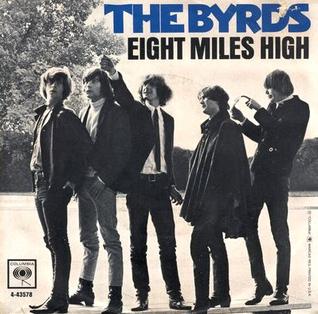
"Eight Miles High" is a song by the American rock band the Byrds, written by Gene Clark, Jim McGuinn, and David Crosby. It was first released as a single on March 14, 1966. Musically influenced by sitar player Ravi Shankar and jazz saxophonist John Coltrane, the song was influential in developing the musical styles of psychedelia and raga rock. Accordingly, critics often cite "Eight Miles High" as being the first bona fide psychedelic rock song, as well as a classic of the counterculture era.
The American Dream is a national ethos of the United States in which freedom includes a promise of the possibility of prosperity and success.
"Triad" is a song written by American singer-songwriter David Crosby in 1967 about a ménage à trois. It was recorded by the Byrds that year, while Crosby was a member of the band, but their version went unreleased at the time and was not issued until twenty years later. Jefferson Airplane released a version of the song in 1968 on their Crown of Creation album and a live version performed by Crosby was included on Crosby, Stills, Nash & Young's 4 Way Street in 1971.

"Lady Friend" is a song by the American rock band the Byrds, written by band member David Crosby and released as a single on July 13, 1967. The single reached number 82 on the Billboard Hot 100, but failed to chart in the United Kingdom. "Lady Friend" is the only song penned solely by Crosby to appear on the A-side of a Byrds' single.

Preflyte is a compilation album by the American folk rock band the Byrds and was released in July 1969 on Together Records. The album is a collection of demos recorded by the Byrds at World Pacific Studios in Los Angeles during late 1964, before the band had signed to Columbia Records and become famous. It includes early demo versions of the songs "Here Without You", "You Won't Have to Cry", "I Knew I'd Want You", and "Mr. Tambourine Man", all of which appeared in re-recorded form on the band's 1965 debut album.
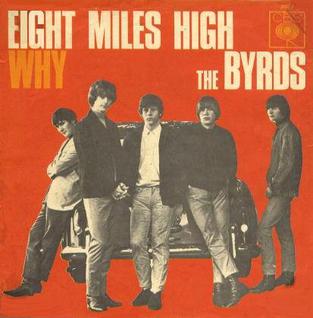
"Why" is a song by the American rock band the Byrds, written by Jim McGuinn and David Crosby and first released as the B-side of the band's "Eight Miles High" single in March 1966. The song was re-recorded in December 1966 and released for a second time as part of the band's Younger Than Yesterday album.

Never Before is a compilation album by the American rock band the Byrds, consisting of previously unreleased outtakes, alternate versions, and rarities. It was initially released by Re-Flyte Records in December 1987 and was subsequently reissued on CD in 1989, with an additional seven bonus tracks.
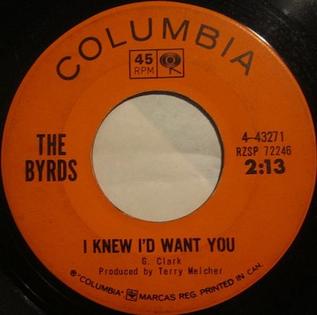
"I Knew I'd Want You" is a song by the folk rock band the Byrds, written by band member Gene Clark, and first released as the B-side to their 1965 debut single, "Mr. Tambourine Man". It was also later included on their debut album, Mr. Tambourine Man.

"Old John Robertson" is a song by the American rock band the Byrds, written by band members Chris Hillman and Roger McGuinn, and first released in July 1967, as the B-side to the non-album single "Lady Friend". It was also later included on the band's 1968 album, The Notorious Byrd Brothers. The version of "Old John Robertson" featured on the single is a substantially different mix from the version that appeared on The Notorious Byrd Brothers.














